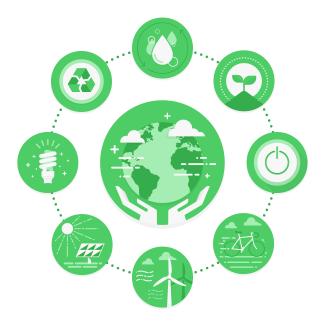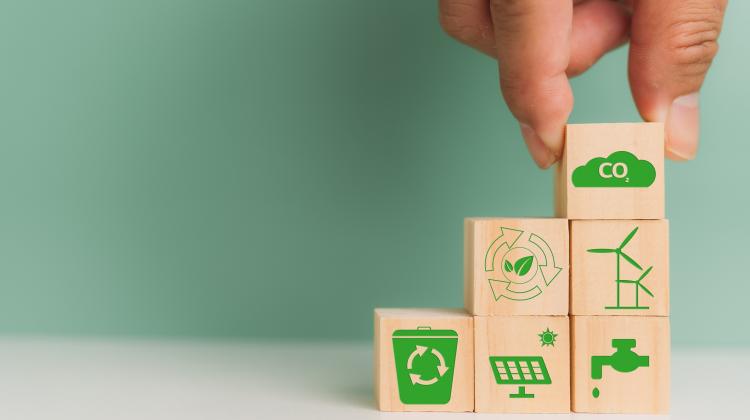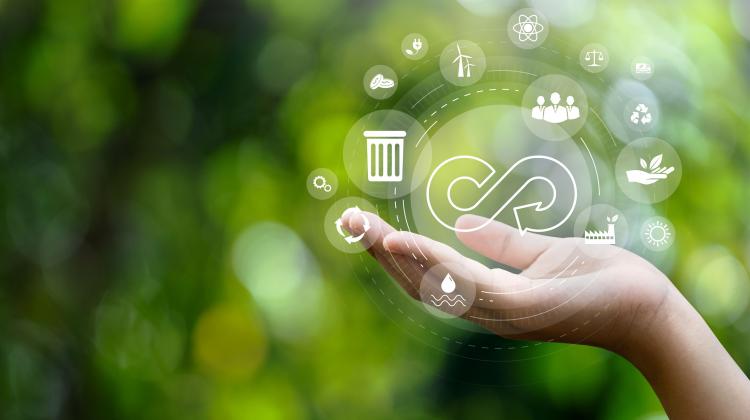A process aimed at satisfying the developmental aspirations of the present generation in a way that enables future generations to achieve the same aspirations
– is the most popular definition of sustainable development, formulated as early as in 1987 by the UN World Commission on Environment and Development.
This is how we should understand sustainable development, treating it as one of the most important ideas which determines all our actions. Companies, organisations, cities and individuals bear responsibility not only for what happens here and now, but above all for shaping the future, i.e. what they leave behind for others. The answer to these challenges, but also an opportunity, is a closed loop economy, i.e. a change in the model of economy. This shift in the economy does not exclude economic growth, nor does it force consumers to give up their needs. They still have the opportunity to benefit from the so-called achievements of civilisation, but in a different way. This way is conscious consumption and responsible shopping. In an ideal model of a circular economy, there is no waste. Waste becomes a raw material with different levels of usefulness for the industrial sector and the consumer.
Why is the circular economy so important?
Imagine all sorts of mines or deposits from which we draw resources on a daily basis. We have coal mines, oil mines, gas mines, gold mines and others. All these resources are non-renewable. They are finite. We may also think that other raw materials that we use every day, such as wood, water, fruit and vegetables, may also unfortunately run out or be insufficient for our needs. This could happen if we use them without thinking and at the rate we are using them today. We extract, process, produce and consume, and when we no longer need the
products we utilise, throw them away or destroy them. It is difficult for such a model to function indefinitely. It would be a big mistake to assume that raw materials will never run out and that there will always be somewhere to throw waste. Earth is a closed ecosystem. Even now, to maintain our consumption at a similar level, we would need a planet 60% larger.
In order to reverse this negative trend, urgent action is needed from all of us and it is the circular economy that is the answer to these challenges.
The circle should close
In a closed loop, the end of a product's life is also the beginning of a new product or service. What is waste for someone else can be a valuable raw material for someone else. Therefore, the most important issue in a circular economy is to find such links and create loops between them. The ideal solution would be to transform the entire production and consumption system in such a way as to completely eliminate the concept of waste from it. Circular economy is currently the only solution for combating climate catastrophe. It makes it possible to significantly reduce greenhouse gas emissions by limiting the extraction and processing of primary raw materials and thus reducing the amount of waste. Circular economy shows the enormous potential of 'waste'. Ideally, producers and consumers should be guided by the idea that waste has enormous potential and that what we throw away today can become a valuable raw material.
It is also very important to use the concept of the circular economy for cities. Today 54% of the world's population lives in urban areas and cities account for 85% of global GDP. Cities are responsible for the consumption of 75% of natural resources, 50% of global waste production and as much as 70% of greenhouse gas emissions. According to OECD calculations, the amount of materials extracted from natural sources and consumed in a year worldwide has doubled compared to 1980. Once used, raw materials and materials are mostly treated as waste. Among EU Member States, households and small businesses produced more than 500 kg of waste per person in 2019. Therefore, generating and implementing ideas to introduce the idea of a circular economy is key to achieving the global sustainable development goals.
"Circular city"
Analysing the needs of city dwellers, it is clear how high the expectation is for the introduction of ecological solutions. Cities are also ideal places to test and evaluate the impact of the circular economy. Elements such as renewable energy, waste, wastewater, construction, support for the private sector or social initiatives, green public procurement, and finally environmental clusters - these are today's challenges for city managers and it will depend on their decisions and involvement how the city will develop. After all, a "circular city" is a safe city, a developing city, and finally, a happy city. It would be necessary here to undertake a thorough analysis of what resources, goods, waste, energy, people, water, air flow through the city? What affects their movement and how can it be improved? What impact does this have on quality of life? And finally, how can these changes be made?
Certainly local authorities, but also civil society, must be at the forefront of climate change strategies. Cities of the future must achieve a certain level of self-sufficiency. Already now, environmental goals should be introduced into city strategies as a major challenge.
The main environmental challenges facing city leaders are energy efficiency, sustainable mobility, efficient water and waste management and management of urban greenery. Cities can become role models for other market players by showing them the right way forward, creating appropriate governance models and raising public awareness. It is important to remember that big changes start with local actions.
A voice from TUL
This is why universities, which shape the awareness of the young generation and indicate development trends in all areas of life, should be important initiators of changes. Certainly, Lodz University of Technology is a part of this ecological trend. It is the university that notices that sustainable development is not just an idea, but real actions. The Sustainable Development Team, established by the Rector of Lodz University of Technology, has the task of intensifying the activities of the university and its stakeholders in order to fulfil the sustainable development goals adopted by the UN. Not only is the infrastructure of the entire campus improving, where many ecological solutions can be seen, but also researchers are carrying out numerous scientific projects in key areas related to sustainable development. The teaching staff also takes up more and more topics related to this area. It is very pleasing that students of Lodz University of Technology with great passion and commitment participate in such classes, more and more often get involved in creating changes and indicate what a "green university" should look like. During the last semester, a project was carried out for the design students, which aimed at generating ecological solutions for the University. The students' ideas and the passion with which they approached the subject prove how important it is for young people.





